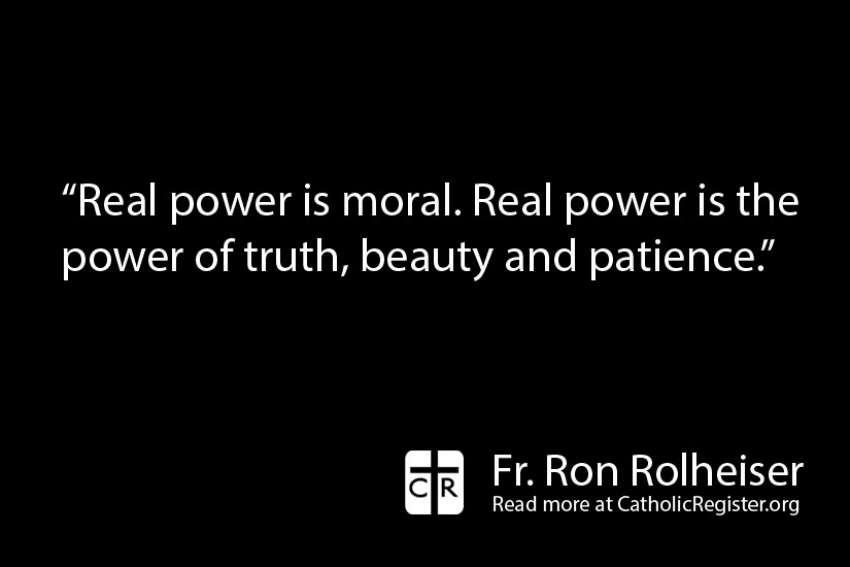God defends Himself only by His patience and His beauty! How true! And how significant for our understanding of power.
The way we understand power is invariably bound up with how we see power exercised in our world. Our world understands power precisely as a force that can lord it over others, a force that can compel others to obey. In our world, power is understood to be real only when it can forcibly assert itself to make others obey it.
For us, strong people have power, political rulers have power, economic systems have power, billionaires have power, the rich and the famous have power, muscular bodies have power and the playground bully has power; power that can make you buckle under, one way or the other.
But such a notion of power is adolescent and superficial. Power that can make you buckle under is only one kind of power and ultimately not the most transformative kind. Real power is moral. Real power is the power of truth, beauty and patience.
Paradoxically, real power generally looks helpless. For example, if you put a powerfully muscled athlete, the CEO of a powerful corporation, a playground bully, an Academy Award- winning movie star and a baby into the same room, who has the most power? Ultimately, it’s the baby.
At the end of the day, the baby’s helplessness overpowers physical muscle, economic muscle and charismatic muscle. Babies cleanse a room morally; they do exorcisms, even the most callous watch their language around a baby.
That’s the kind of power God revealed in the incarnation. Against almost all human expectation, God was born into this world, not as Superman or Superstar, but as a baby, helpless to care for its own needs. And that’s how God is still essentially present in our lives. Pulitzer Prize-winning writer Annie Dillard suggests this how we forever find God in our lives, as a helpless infant lying in the straw whom we need to pick up and nurture.
She’s right, and her insight, like that of Bloy, has huge implications for how we understand God’s power in our lives and for how we understand God’s seeming silence in our lives.
First, God’s power in our lives. When we examine the biblical account of Adam and Eve and original sin, we see that the primary motivation for eating the apple was their desire to somehow grasp at divinity, to become like God. They wanted God-like power. But they, like us, badly misunderstood what makes for genuine power.
St. Paul shows us the antithesis of that in how he describes Jesus in the famous Christological hymn in the Epistle to the Philippians. Paul writes that Jesus did not deem equality with God something to be grasped at, but rather that He emptied Himself of that power to become helpless, trusting that this emptying and helplessness would ultimately be the most transformative power of all. Jesus submitted to helplessness to become truly powerful.
That insight can shed light on how we understand God’s apparent absence in our world. How might we comprehend what is often called “the silence of God”? Where was God during the Holocaust? Where is God during natural disasters that kill thousands of people? Where is God when senseless accidents and illnesses take the lives of countless persons? Why doesn’t God forcefully intervene?
God is present and intervening in all these situations, but not in the way we ordinarily understand presence, power and intervention. God is present the way beauty is present, in the way a helpless, innocent newborn is present, and in the way truth as a moral agent is always present.
God is never silent because beauty, innocence, helplessness and truth are never silent. They’re always present and intervening, but unlike ordinary human power, they’re present in a way that is completely non-manipulative and fully respectful of your freedom. God’s power, like that of a newborn, like the power of beauty itself, fully respects you.
When we look at the struggles within our world and within our private lives, it often seems like divine power is forever being trumped by human power.
Like David, standing with just a boy’s slingshot before Goliath, a giant who looks overpowering in terms of muscle and iron; and just like the apostles being asked to set five little loaves of bread and two tiny fish before a crowd of 5,000, God always looks underwhelming in our world.
But we know how these stories end.
(Fr. Rolheiser can be reached at ronrolheiser.com)


